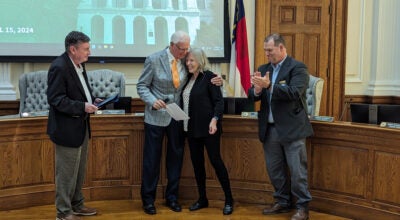City Council questions allowing trailers as second homes on rural lots
Published 12:00 am Wednesday, June 18, 2014
SALISBURY — City Council could not agree on a proposed change that would allow rural residents to put mobile homes on their lot, alongside their primary house.
Council members tabled the request for further study. Salisbury Planning Board unanimously recommended approval, but council members Brian Miller and Karen Alexander and Mayor Paul Woodson had concerns.
“There is something about the idea of just parking a trailer behind the house regardless of lot size that does not feel right to me,” Miller said.
Miller said the proposal made him envision houses on the periphery of the city with a trailer in the back.
Alexander said Salisbury has worked to implement design standards across the city, and this change would create an incongruence.
“You’re riding down the road, and there’s no consistency to it,” she said. “Big houses next to trailers.”
The proposed change would allow mobile homes and other types of secondary dwellings anywhere on a lot that is zoned rural residential and larger than 5 acres. If the lot is smaller than 5 acres, the mobile home would have to stand beside or behind the primary house.
Only in rural residential zoning, the secondary home could be manufactured housing.
Secondary homes are currently limited to 750 square feet. The text amendment would allow secondary homes up to 40 percent of the size of the original house. In rural residential, secondary homes could exceed that limit if City Council granted a special use permit, which requires a public hearing.
No one spoke at City Council’s public hearing, but Ann Meacham told the Planning Board she and her husband would like to put a mobile home on their property at 1312 Faith Road for their son and daughter-in-law. All four people are disabled, Meacham said, and they count on each other for care.
Earlier this month, City Council voted to rezone the Meachams’ property and several other Faith Road lots from general residential to rural residential to comply with the Eastern Gateway Area Plan.
Preston Mitchell, the city’s Planning and Development Services manager, said the Meachams understand the social implications of the proposed change. Mitchell said he recommended the text amendment because putting a mobile home on a large, rural lot would allow people to have family members or caretakers living close by.
While mobile homes would have meet underpinning requirements, they would have no foundation and would not be permanent like stick-built homes, he said.
Alexander said 20 years from now, areas currently zoned rural residential in the extraterritorial jurisdiction could be the city’s next subdivisions. Large, brick homes in rural areas have a sense of permanency and neighborhood, she said.
Adding mobile homes to the lots is “totally not in keeping with applying design guidelines equally across our community,” she said. “We want the standards to be the same.”
Mitchell said mobile and manufactured homes are not going away.
“We would be doing ourselves and our community an injustice if we were trying to zone ourselves out of that type of housing,” he said.
Alexander asked if the city could accommodate the Meachams in some way other than altering the city’s Land Development Ordinance. Woodson sent the issue to a committee made up of Alexander and Mayor Pro Tem Maggie Blackwell for study.
Contact reporter Emily Ford at 704-797-4264.




